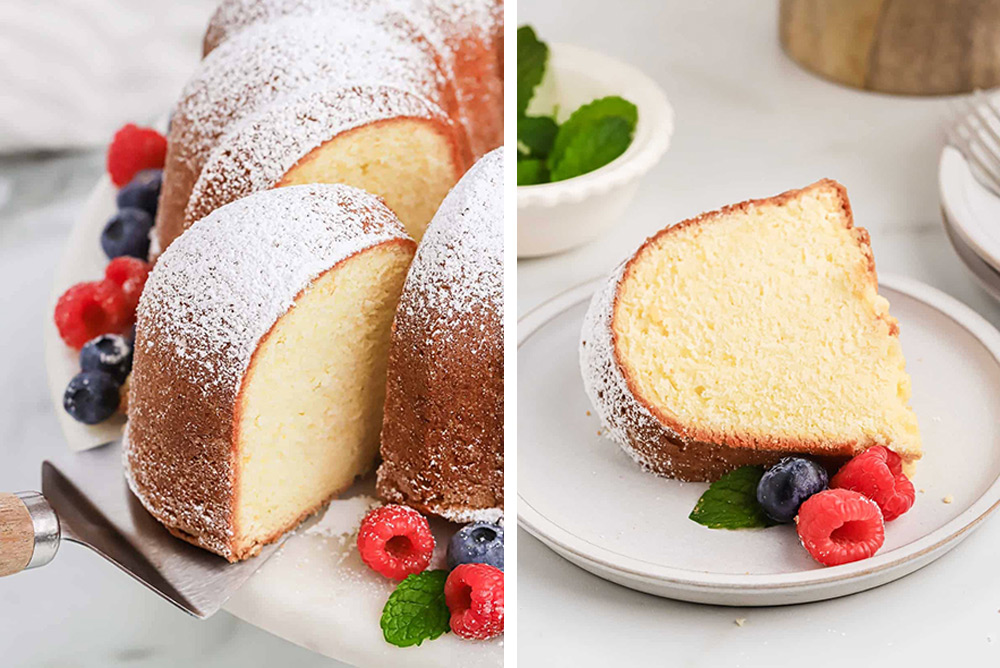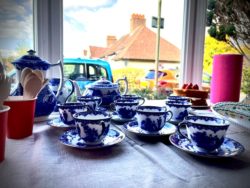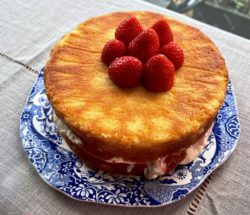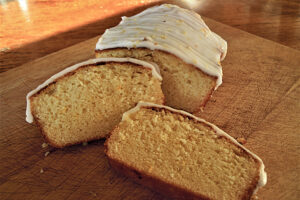By Nancy Pollard
After owning one of the best cooking stores in the US for 47 years—La Cuisine: The Cook’s Resource in Alexandria, Virginia—Nancy Pollard writes Kitchen Detail, a blog about food in all its aspects—recipes, film, books, travel, superior sources, and food-related issues.
 THE BRITISH are masters at making a ceremony out of almost anything. What they create in pomp and circumstance around royal coronations, weddings, and funerals is without peer and watched worldwide. But it is not just limited to an elite class. Every soul in England is tied to the celebration of tea. You have your elevenses (if someone is working at your house, you always prepare a spot of tea for them at 11am) or your afternoon tea at home or in a tea shop with the requisite sweets. Even my mother absorbed this tradition. Both my parents were professed admirers of English customs,
THE BRITISH are masters at making a ceremony out of almost anything. What they create in pomp and circumstance around royal coronations, weddings, and funerals is without peer and watched worldwide. But it is not just limited to an elite class. Every soul in England is tied to the celebration of tea. You have your elevenses (if someone is working at your house, you always prepare a spot of tea for them at 11am) or your afternoon tea at home or in a tea shop with the requisite sweets. Even my mother absorbed this tradition. Both my parents were professed admirers of English customs,
as my father was christened at Fowey in Cornwall and my younger brother was named after Kenneth Grahame and Arthur Quiller Couch. My mother prepared a “proper” afternoon tea for us at home during school days. She served tea from a silver service that she had received from my father’s family for their wedding. We almost always had cinnamon toast and occasionally her molasses pecan cookies. Teatime served as a non-bickering moment among us siblings.
Since we visited my daughter Anastasia and her family in England in time for her birthday, she had a Champagne Tea at her home to celebrate. A floral bouquet crowned a strawberry vase. The house and patio were rearranged to make room for numerous guests, both tall and small. Her husband made tea sandwiches—cucumber and cheese, ham and mustard, egg salad and, of course, sausage rolls. Her father, true to his calling as The Resident Wine Maniac, chose an array of bubblies—Ferghettina Francia Corta rosé and a Laurent Perrier rosé. (Pink is Anastasia’s favorite color.) And an English breakfast was served using her husband’s grandmother’s tea service.
About the Tea Cakes
But Anastasia was in charge of cakes. In fact, cake is not viewed as a dessert in England; it is reserved for tea. The British Isles Insider (that’s Anastasia) has tried to educate me on this serious subject for years. She has baked several traditional recipes and has embraced the challenge of taking the revered Victoria Sponge and Lemon Drizzle to a more delicious level. I have found traditional English recipes for both to be a bit sturdy in texture—not quite melt-in-the-mouth. For a definitive history and discussion of Vicky Sponge recipes, you can do no better than to read Felicity Closke’s treatise in The Guardian. Closke also philosophizes on Lemon Drizzle in another Guardian article. Another cake for the occasion—Chocolate Guinness cake—was brought by one Anastasia’s dearest friends, and I have asked for her recipe.
Since Anastasia was making three cakes and baking them on the morning of the tea party, she used a single recipe for both the Victoria Sponge and the Lemon Drizzle. In one of her many cake searches, she discovered (and I am now following) a delightful American food blogger who is clearly Southern. The site is Grandbaby Cakes and the writer is Jocelyn Delk Adams, whose family is from Mississippi. Jocelyn Delk Adams’s grandmother’s caking and baking inspired her blog, and she shares some interesting culinary history and great advice. For instance, Jocelyn has created her own formula for greasing and flouring cakes. Praise for her Cream Cheese Pound Cake is splashed all over the Internet. It is sturdy but meltingly delicious with or without toppings. The recipe is ample enough for a 12-cup tube pan.
Anastasia uses this batter for two 7-inch layers of Victoria Sponge, and the remainder goes into an American 1-pound loaf pan for her Lemon Drizzle. In the US, you can use two 8-inch layer pans. She follows the author’s detailed instructions to the letter—and Jocelyn Delk Adams is extremely thorough. The only addition Anastasia made to Adams’s pound cake recipe is the addition of 1½ teaspoons of baking powder—and that does change the texture. Her Vicky Sponge is filled either with strawberry or raspberry jam with fresh berries to match or with an Ottolenghi white chocolate ganache that has some whipped cream folded in. The top layer remains unfrosted but is garnished with the themed fresh fruit. For the Lemon Drizzle, she follows the traditional formula of using 100 grams of granulated sugar (not caster sugar or powdered sugar) to the strained juice of two lemons. Once the cake is out of the oven, but still in the pan, she pokes holes in the cake and liberally pours the glaze all over. It should have a crunchy glaze. Then, when it has cooled completely, she removes the cake from pan and parchment.
Cream Cheese Pound Cake (With a Variation)
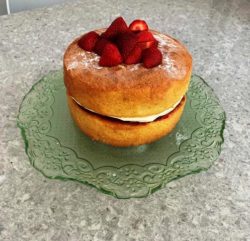
- 1½ cups (341gr) unsalted butter, at room temperature
- 2 tablespoons oil or shortening
- 8 ounces (227gr) cream cheese, at room temperature
- 2¾ cups (550gr) granulated sugar
- 6 large eggs, at room temperature
- 3 cups (375gr) sifted cake flour
- ½ teaspoon fine sea salt
- 1 tablespoon vanilla extract
- Powdered sugar for garnish
- Preheat oven to 325F (160C) and grease thoroughly a 12-cup (2¾L) Bundt pan with butter and then flour the interior.
- In a mixer bowl, add butter, oil or shortening, and cream cheese and beat for 2 minutes on high speed.
- Slowly add the granulated sugar, beat on high speed for an additional 7 minutes until very pale yellow and fluffy. There is no leavening in this cake because we add ample air to the cake by having a very long creaming period. (See note below.)
- Next, add the eggs, one at a time, combining well after each addition and scraping down the sides as needed.
- Turn your mixer down to its lowest speed and slowly add flour into batter in two increments, then add salt, being careful not to overbeat.
- Lastly add in the vanilla extract, scrape down the sides of the bowl and mix until just combined and turn off the mixer.
- Pour the cake batter into the prepared Bundt pan and bake for an hour plus 15-20 minutes or until a toothpick inserted in the center of the cake comes out clean.
- Cool in the pan on a wire rack for 10 minutes, then invert the cake on a serving platter. Leave it for at least an hour or until the cake is cool to touch.
- Dust with powdered sugar and serve.
- Anastasia adds 1½ teaspoons baking powder to the flour if she is making her variation of two British cakes for teas, Victoria Sponge and Lemon Drizzle.
- Baking times will be about 30-40 minutes for the layers and 45 minutes for the loaf pan. Simply do the toothpick test or check with a Thermapen for a temperature of 195F.
For her third “improper” cake, Anastasia chose Helen Goh’s homey, lumpy, and totally 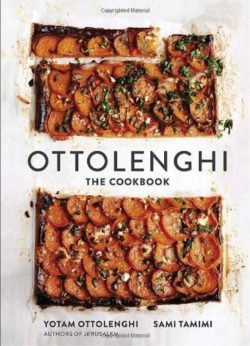 scrumptious apple and olive oil cake with an unusual maple frosting. Helen herself is Malaysian, raised in Australia, and always has unusual tastes and textures in her baking. You can find it in the first Ottolenghi cookbook to hit the US. I have made this cake myself in the JanFebs, and it does help you get through this most difficult time of the year. This cake is even better the next day as the apple keeps the cake moist, the frosting is still irresistible—and it is truly child’s play to put together. Some bakers don’t even slice it to make two layers and just heap the frosting on top.
scrumptious apple and olive oil cake with an unusual maple frosting. Helen herself is Malaysian, raised in Australia, and always has unusual tastes and textures in her baking. You can find it in the first Ottolenghi cookbook to hit the US. I have made this cake myself in the JanFebs, and it does help you get through this most difficult time of the year. This cake is even better the next day as the apple keeps the cake moist, the frosting is still irresistible—and it is truly child’s play to put together. Some bakers don’t even slice it to make two layers and just heap the frosting on top.
Apple and Olive Oil Cake With Maple Icing
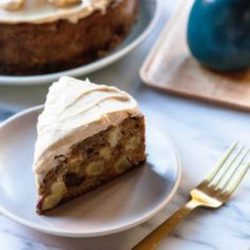
- 89gr (a bit over 3 ounces) sultanas (golden raisins)
- 4 tablespoons water
- 280 gr (10 ounces) white all-purpose flour
- ¼ teaspoon fine sea salt
- ½ teaspoon ground cinnamon
- ½ teaspoon baking powder
- 1¼ teaspoon baking soda
- 120 ml (½ cup) olive oil
- 160gr (6 ounces) caster sugar
- ½ vanilla pod or equivalent in an excellent vanilla essence
- 2 large eggs, lightly beaten
- 2 Bramley apples (see note below), peeled, cored, and cut into 1-cm dice
- Grated zest of 1 lemon
- 2 egg whites
- For the maple icing:
- 100gr (3½ ounces) unsalted butter, at room temperature
- 100gr (3½ ounces) light muscovado sugar
- 85ml (1 bit more than 1/3 cup) maple syrup
- 220gr (7½ ounces) cream cheese, at room temperature
- Grease an 8-inch (20cm) cake pan and line the base and sides with baking parchment.
- Place the sultanas and water in a medium saucepan and simmer over low heat until all the water is absorbed. Allow to cool.
- Preheat oven to 170C (340F) and sift together flour, cinnamon, salt, baking soda, and baking powder and set aside.
- Put the oil and sugar in a mixer bowl fitted with a paddle attachment.
- Strip the vanilla pod of its seeds with a sharp small knife or add the equivalent in vanilla extract.
- Beat the oil, sugar and vanilla together and then gradually add the eggs.
- The mix should be smooth and thick at this point.
- Mix in the diced apples, sultanas and lemon zest, then lightly fold in the dry ingredients.
- Whisk the egg whites in a clean bowl either by hand or with a mixer until they have a soft meringue consistency.
- Fold them into the batter in two additions, trying to lose as little air as possible.
- Pour the batter into the lined cake pan, level it with a palette knife and place in oven.
- Bake for 90 minutes or until a skewer inserted into the middle of the cake comes out clean.
- Remove from oven and allow to cool in the pan.
- Once the cake is completely cool, you can assemble it.
- Remove from pan and slice horizontally into two layers.
- If the top layer is domed, slice it off to create an even top.
- To make the icing, beat together, either by hand or using the paddle attachment of your mixer, the butter, muscovado sugar, and maple syrup until light and fluffy.
- Add the cream cheese and beat until the icing is totally smooth.
- Spread the icing thickly over the bottom layer of the cake, then top it with the top layer.
- Spread the top with the remaining icing.
- There should be enough icing to make a crumb coating on the side and top.
- Refrigerate until cold and then ice the top and sides.
- Helen Goh does not ice the sides; she uses all the icing on the two layers.
- In the US, use Braeburn or Jonagold apples.

